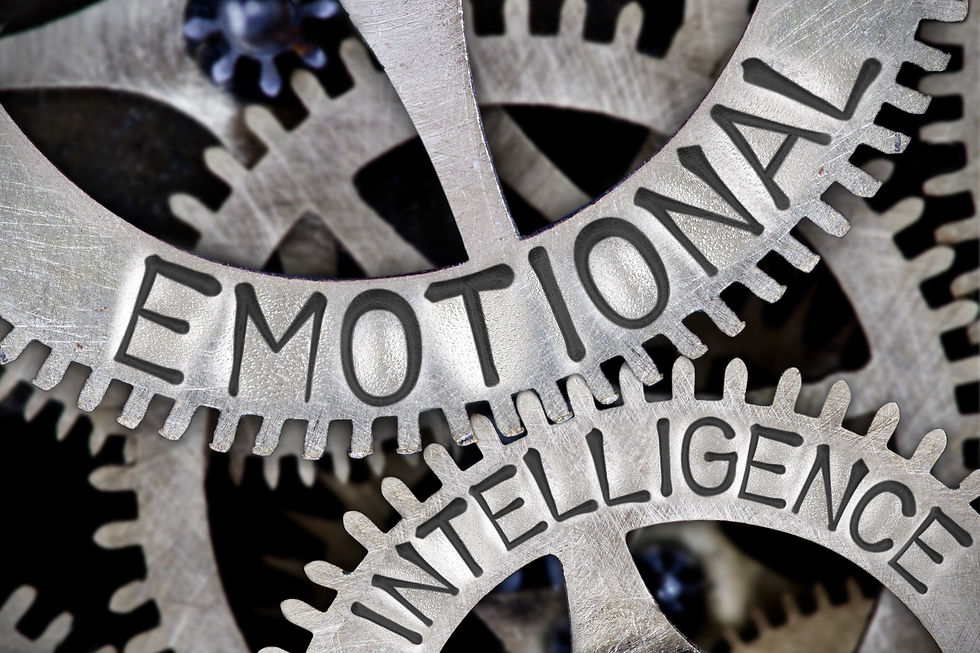The importance of emotional intelligence in modern leadership
- Derek Moore

- Jun 16, 2023
- 4 min read
Introduction
The most successful leaders today are those who can empathize and trust others. Emotional intelligence (EI) is the ability to understand your own emotions, as well as those of others. Emotionally intelligent leaders know how to channel their negative emotions constructively. EI involves four skillsets: self-awareness, self-management, social awareness and relationship management. It's important for leaders at any level to be able to read their own feelings and recognize how they impact their behavior—and then respond appropriately by choosing healthy behaviors over unhealthy ones.

The most successful leaders today are those who can empathize and trust others.
The most successful leaders today are those who can empathize and trust others. Empathy is the ability to understand and share the feelings of others. It's an essential component of emotional intelligence (EQ) because it helps you build trust, which is essential for effective leadership.
A leader with strong EQ will have a better understanding of what's going on around him or her, both inside and outside the organization. Leaders who lack empathy may make decisions based solely on logic without considering how those decisions will affect their employees' morale or productivity levels--which could lead to negative outcomes like high turnover rates and low employee engagement scores among workers who feel ignored by management because they weren't asked for input before making important decisions affecting them personally
Emotional intelligence is the ability to understand your own emotions, as well as those of others.
Emotional intelligence is the ability to understand your own emotions, as well as those of others. It's a set of skills that allow you to recognize and understand what you are feeling, and then use this understanding to manage your emotions.
Emotional intelligence (EI) is also known as emotional quotient (EQ) or interpersonal competence. The term was coined by psychologist Daniel Goleman in 1995; he defined it as "the ability to monitor one's own and others' feelings and emotions."
In modern business organizations, emotional intelligence plays an increasingly important role in employee success. According to Peter Salovey and John Mayer (1995), two pioneers in emotional intelligence research: "For most people...success in life depends not just on intellectual prowess but also on social skills such as kindness, cooperation and self-awareness."
Emotionally intelligent leaders know how to channel their negative emotions constructively.
Emotionally intelligent leaders know how to channel their negative emotions constructively.
For example, if you're feeling frustrated with a team member, it's important not just to let that frustration build up inside of you. Instead, take some time for yourself and try thinking about what might be causing the problem in the first place--and then come up with solutions for fixing it! You'll feel much better once those feelings have been dealt with productively.
Emotional intelligence is also helpful when it comes time for problem solving: if someone on your team has an idea for improving productivity or reducing costs, but other people aren't listening because they don't like him/her personally (for example), emotional intelligence can help bridge this gap by helping everyone focus on what matters most--the work itself--rather than personal feelings toward each other
Emotionally intelligent leaders are aware of their strengths and weaknesses, and they work on improving their weaknesses.
Emotionally intelligent leaders are aware of their strengths and weaknesses, and they work on improving their weaknesses. This is a crucial element in leadership development because it allows you to be more self-aware and better manage your emotions.
You can't improve what you don't acknowledge, so knowing what kind of leader you are will help you grow as an individual in all areas of life including business, relationships and personal development. It's important for leaders to have this awareness so they can focus on where improvement is needed most instead of wasting time trying to fix something that isn't broken (or won't ever be).
Emotionally intelligent individuals are able to self-regulate their emotions by regulating their thoughts, feelings and behaviors in healthy ways.
Emotionally intelligent individuals are able to self-regulate their emotions by regulating their thoughts, feelings and behaviors in healthy ways.
● Understand the difference between thoughts, feelings and behaviors:
● Understand how to regulate thoughts, feelings and behaviors:
● Do this on a daily basis:
Emotional intelligence is an important component of leadership because it helps leaders understand how they react under stress or pressure; how they communicate with others; if they are able to maintain composure during challenging situations; if they can empathize with employees who may be experiencing difficult times at home or at work; etc. Having good emotional intelligence will also help leaders build trust among team members so that employees feel comfortable communicating openly with each other about personal issues without fear of being judged harshly by management as opposed to being encouraged instead."
Having emotional intelligence is vital for being a good leader today.
Emotional intelligence (EI) is a set of skills that can be learned. It's a key trait for leaders and improves communication, leadership skills, team performance and work-life balance.
Emotional intelligence is all about being aware of your own emotions as well as those around you; it involves managing those feelings in order to make good decisions and get along with others. The best way to develop emotional intelligence is through practice: start by identifying the emotions you're experiencing (anger? happiness?), then think about why they have come up and what caused them. You might even want to consider writing down whatever thoughts come into your mind so that later on when things calm down again or another situation arises where emotions play an important role in decision making, this information will be there for reference purposes!
Conclusion
Emotional intelligence is the ability to understand your own emotions, as well as those of others. It's vital for being a good leader today, because it allows you to empathize with your employees and motivate them. Emotionally intelligent individuals are also able to self-regulate their emotions by regulating their thoughts, feelings and behaviors in healthy ways.




Comments